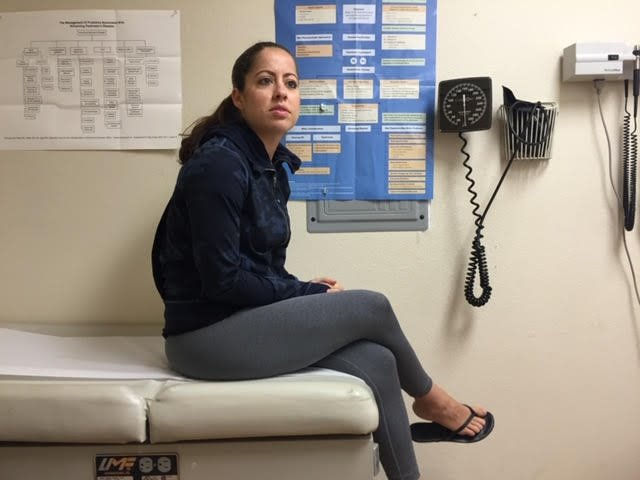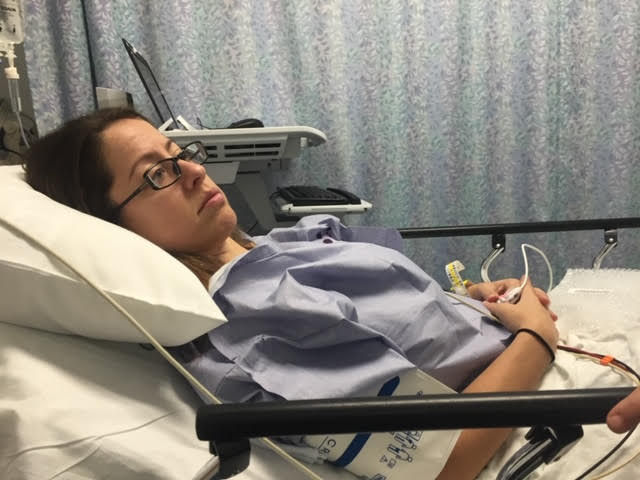I’ll just pick up where I left off. Sorry to keep you waiting on the follow up! I’ll just assume you’ve read the latest blog and continue with how I was finally diagnosed with Myasthenia Gravis. If you haven’t read the last post, find it here to get caught up.

We are now in 2015, it’s been over 2 years of symptoms, doctors, acceptance, and suffering. I found my diagnosis through Google but since no one accepts that as facts (who knew?), I made an appointment with a Neurologist to confirm my suspicions. The appointment began like any other except this time they had me fill out 2 questionnaires prior to seeing the doctor; one questionnaire to consider or exclude migraines and the other for Multiple Sclerosis. I remember checking off yes to a lot of the items/symptoms on both. This concerned me in different ways. I had heard of MS before and was now concerned that may be a possibility I hadn’t yet considered or explored. I knew (or had heard) about the severity of the disease and that it could be progressive and was incurable. I was scared about the possibility of being diagnosed with migraines again since I knew something else was seriously wrong and that I needed help; I didn’t want my symptoms and experience to be chalked up or dismissed to migraines again.
"Now sitting in his office, through tears, I told him that something was seriously wrong with me and that if he dismissed me or didn’t take me seriously, I didn’t know what I would do."
When the doctor walked in, sat down, and asked me to tell him why I was there, I immediately broke down. In the last 2 years, I had only cried once despite all of the uncertainty and the huge impact these symptoms had on my quality of life. Now sitting in his office, through tears, I told him that something was seriously wrong with me and that if he dismissed me or didn’t take me seriously, I didn’t know what I would do. I told him I couldn’t continue to live like this and it was taking it's toll. Thankfully, he sat there and listened to me intently for over an hour. He took notes and asked some questions along the way but the most important part of that whole conversation was that HE HEARD ME. I hadn’t felt heard throughout this whole experience. I hadn’t felt like I was taken serious. I felt dismissed, overlooked, and completely on my own.

After I was done explaining what I had gone through, he looked at me and he apologized. He said he was sorry for my experience and that I hadn’t been helped sooner. I sighed with relief. He then continued by asking if I had heard of Myasthenia Gravis. Not wanting to admit to a google self-diagnosis, I casually said I had heard a little bit about it. Based on my symptoms, he told me he narrowed his suspicions down to Myasthenia Gravis and Multiple Sclerosis for the possibilities causing my symptoms. On a side but related note, I didn’t have health insurance at the time. I was naïve to believe that I was healthy and it was a waste of money. Don’t judge! I know better now, obviously. Anyways, knowing that I didn’t have insurance, he recommended we start with an MRI first to check for lesions on the brain common in MS. That would be the most cost effective option for me. There was a blood test for MG but since the disease is rare, the blood test isn’t common and therefore can be very expensive, especially paying out of pocket. Something in my gut had told me from the moment I found it on google to the moment I was now sitting in his office that I had Myasthenia Gravis. I insisted on getting the blood work done. We scheduled the MRI as well for the next day so those results would most likely come back before the MG blood work anyway.
I immediately drove to the lab to have my blood drawn. After signing in, I was called up and pulled aside. They asked me if I was aware that the blood draw would be $1,375 and offered to call the doctor to see if there was a less expensive option/test. After realizing there wasn’t, I paid for the test without hesitation. Me, the woman who wouldn’t even pay for health insurance. I was sent back to have my blood drawn when the tech told me that she hadn’t seen this test ever in the 25 years she worked there and that I must be something special. Ha!

The next day, I went and got an MRI of my brain. I waited for both results. The MRI came back first, and within a couple of days. When the doctor called me, he said that they didn’t find any lesions and we could most likely rule out Multiple Sclerosis. Oh, thank God! I wasn’t surprised but yet I was slightly reassured. He did say however, that they had found a brain tumor. My heart sank. He went on to say that the tumor was more than likely representing a meningioma which is more commonly benign and very slow growing. While that was reassuring, he did explain that a mass or tumor of any kind in the brain doesn’t mean you’re out of the woods. There isn’t much room in the brain for things to grow that don’t belong there and they can greatly impact surrounding areas causing all sorts of symptoms. It would have to be closely monitored for awhile. I asked if that was the cause of my symptoms to which he replied it wasn’t. After hanging up, I immediately had to leave for work and coach fitness classes. On the drive there, I remember thinking, “Oh my god, I have a brain tumor.” It felt surreal, scary, and very overwhelming and yet, I still didn’t have the reason for my symptoms. My reality had already begun to shift yet I still didn't quite grasp what was in store for me.
A couple days later, I was out shopping with my mom and my boys at Target. I remember it like it was yesterday. It was a Friday afternoon and I was standing in the toy section while my kids browsed when I got the call. My neurologist told me the blood test came back positive for Achr antibodies only found in Myasthenia Gravis and that would confirm my diagnosis. I'd waited years for this moment and now I knew I had MG. He said that he needed to see me right away that day and he would clear his schedule for me to come in as soon as possible. Oddly enough, I hung up feeling relieved. I finally had a diagnosis and could be treated. I felt validated. This wasn't in my head. This hadn't been stress or anxiety. I didn’t know much about MG or what was next; I had always just assumed that doctors were there to fix you and now that we knew what was wrong, I’d be fixed too. I did find it odd that he had such a sense of urgency to see me. I called my husband and told him I had Myasthenia Gravis. Like me, he didn’t knew what that would mean for our lives or our future.

After driving home to meet him, he and I took off for the Neurologist. Upon arrival, the doctor took us back right away into his office. You know, the one you go to when you’re about to receive serious or bad news. He began to explain what the disease is and what this would mean for me, for us. He also explained that the breathing issues I attributed to anxiety were more than likely a symptom of Myasthenia Gravis which could lead to an MG Crisis where the diaphragm muscles are too weak to breathe. That requires intubation until you gain your strength again and are able to breathe on your own. Ah, so that was the reason for the urgency. He said based on what I had told him about the severity of my symptoms and of my physical examination with him, confirmed by blood, he contemplated admitting me into the hospital. Being naïve, optimistic, and very much in denial, I told him I was fine and that we would try the medication he recommended called Mestinon to see how I responded first. I couldn’t help but notice that throughout this meeting, he kept referencing articles and information on his computer. He often used Google to source facts and details about Myasthenia Gravis. One of the things he said that stood out most was, “There is no cure.” We discussed our options and a plan of action. The first step would be to schedule a CT scan to check my Thymus. A thymus that is enlarged or that has a tumor could be contributing or causing symptoms and the CT would be able to detect that. I remember during that whole conversation I kept it lighthearted and smiled the whole time. Thinking back about my reaction, I wonder what his thoughts were.
One of the things to stand out most was when he said, “There is no cure.”

I remember my husband and I leaving his office finally, both in shock and both in denial. What happened to our world? Once we got to the car, I didn’t know whether to laugh or to cry. I typically resort to smiling and laughter when things are uncomfortable or become too hard to process. I didn’t know what to do. One thing I did know for sure though, my life, our life, would never be the same.
Comentarios